 Dr. Jeff volek a professor of sports nutrition at The Ohio State University was the lead off speaker. He talked about the benefit of becoming “Ketoadapted” (following a very low carb, high fat diet for an extended period, sometimes called fat adaptation). He pointed out that someone who is not ketoadapted can burn a maximum of 1.0 grams of fat per minute while someone who is ketoadapted which can take 12-18 months can burn up to 1.5 grams of fat per minute. He showed a great example of how the heart fat adapts. It’s long been known that the heart prefers to burn ketones and the fatty acids from which ketones are made. PET Scan are used by doctors to look for cancer because cancers take up a lot of glucose. Any tissue on a PET Scan that is taking up a lot of glucose will turn black so cancers will turn black. If you look at the 2 PET scans below the one on the left being from a non ketoadapted person and the one of the right from someone who is ketoadapted you will see that the heart is very dark on the left and circled in red while the heart is not visible in the person on the right because it is no longer burning glucose, it’s burning fat and ketones.
Dr. Jeff volek a professor of sports nutrition at The Ohio State University was the lead off speaker. He talked about the benefit of becoming “Ketoadapted” (following a very low carb, high fat diet for an extended period, sometimes called fat adaptation). He pointed out that someone who is not ketoadapted can burn a maximum of 1.0 grams of fat per minute while someone who is ketoadapted which can take 12-18 months can burn up to 1.5 grams of fat per minute. He showed a great example of how the heart fat adapts. It’s long been known that the heart prefers to burn ketones and the fatty acids from which ketones are made. PET Scan are used by doctors to look for cancer because cancers take up a lot of glucose. Any tissue on a PET Scan that is taking up a lot of glucose will turn black so cancers will turn black. If you look at the 2 PET scans below the one on the left being from a non ketoadapted person and the one of the right from someone who is ketoadapted you will see that the heart is very dark on the left and circled in red while the heart is not visible in the person on the right because it is no longer burning glucose, it’s burning fat and ketones.
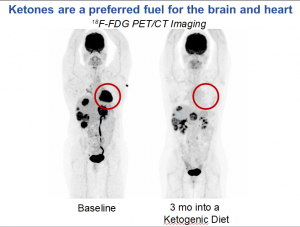
He went over the 10 reasons that he thinks that a ketogenic diet is healthier than a carb based diet. (1) we can store a whole lot more fat energy than carb energy. We can store at a maximum about 2,500 calories as glycogen (the starch humans use to store glucose), about 4-500 calories in the liver and 2000 in the muscles while even a thin marathoner can store at least 30,000 calories as fat. The problem is that once glucose get stored as glycogen in a muscle cell it can only be burned by that cell, it is impossible for muscle cells to break down glycogen and dump the sugar back into the blood stream to say feed the brain, eyes, ovaries, red blood cells and other cells that can only burn glucose. Since the muscle and organ tissue of ketoadapted folks have learned to prefer ketones and fatty acids there is plenty of glucose left for the cells that can only use it in ketoadapted people. Also Ketoadapted people get better at turning excess protein and the glycerol backbone of the triglycerides in glucose than non ketoadapted people. (2) Storing fat is more efficient since fat doesn’t have to be stored in water but glycogen does have to contain a fair amount of water. That’s why 1 gram of fat contains 9 calories while a gram of carbohydrate only contains 4 calories because of the water dilution, so fat is a lighter fuel to carry around. (3) Since ketoadapted athletes can use more fat for energy during events they have less need to consume calories during an event. (4) Burning fat produces fewer free radicals in the mitochondria thus less damage. This is why ketoadapted athletes have shorter recovery times after training or competing. (5) Betahydroxybutarate (a ketone body) is also a signaling molecule that decreases inflammatory pathways again contributing to faster recovery times. (6) Ketoadapted athletes have enhanced recovery times which we have already discussed. (7) The ketoadapted brain is “bonk proof”. Bonking also known by marathon runners as “hitting the wall” occurs when an athlete in an endurance event runs out of glycogen stores. Obvious this is a much smaller problem for ketoadapted athletes as we discussed above. (8) Greater ease of weight loss. He described a 12 week study he did at Ohio State for the military where 15 ROTC students went on a ketogenic diet while 14 controls didn’t. It wasn’t aimed at weight loss but the ketogenic group lost 13 lbs (5.9 kg) with a 44.0% decrease in the dangerous viceral fat around the organs while the control group lost 1.3 lbs (0.6 kg) with viceral fat increasing by 8.0%. (9) In ketogenic athletes the level of polyunsaturated fat in the cell membranes went up which is associated with increased insulin sensitivity. (10) Enhanced career longevity. With less damage from free radicals it may well be that ketogenic athletes may enjoy a longer competitive career. In the Q&A session he was asked about how much protein one should consume on a ketogenic diet that would be enough to increase muscle mass but not throw the person out of ketosis. He said the sweet spot was somewhere between 1.2 and 2.0 grams per kg per day depending on insulin resistance. Other interesting comments from the Q&A were about taking carbs during long endurance races. He said that some ketogenic athletes ingested up to 100 calories per hour of carbohydrate but were burning over 600 calories per hour so this represented a small fraction of the energy and did not throw them out of ketosis but did give their performance a boost.
Luis Villasenor and Tyler Cartwright have had amazing personal transformative stories. In both cases a ketogenic diet in the setting of a well constructed exercise program has transformed both their lives for the better. I’ll let their pictures speak for them:

Luis Villasenor
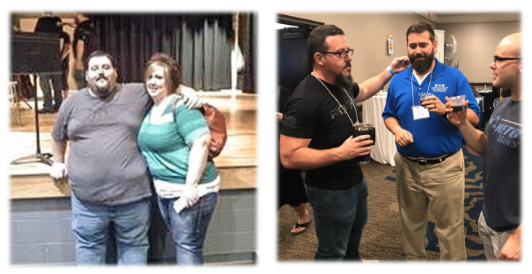
Tyler Cartwright
They showed a study which demonstrated that there was no difference in muscle growth between a group of athletes who took 25 g of protein before lifting and a group that took 25 g of protein plus 50 grams of carbohydrate thus they conclude that carbs are not necessary for muscle growth. They felt the sweet spot for protein intake was 0.8 grams of protein per pound of lean body mass per day (1.76 grams of protein per kilogram lean body mass per day). They believed that it was necessary to take at least 25 grams of protein before lifting because muscle growth is triggered by a threshold of leucine and pointed out that the amount of leucine needed was much higher in older people.
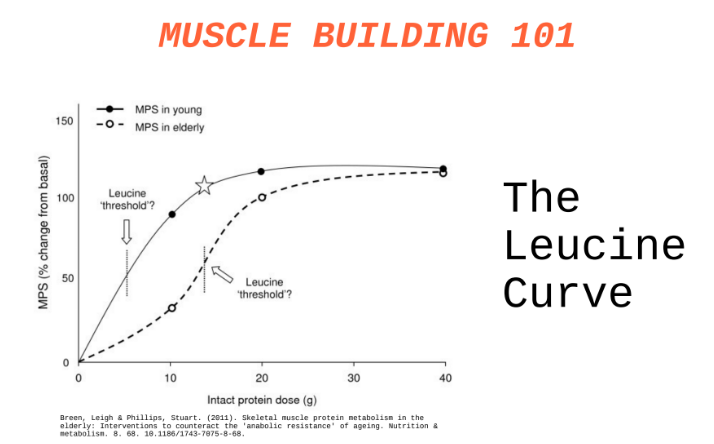
For more information, here’s a link to the Ketogains Website.
 Dr. Jacob Wilson and Ryan Lowery are the co-founders of The Applied Science & Performance Institute. They do cutting edge research on all aspects of human performance and live a ketogenic lifestyle. They gave a very eclectic talk on the advantages of a ketogenic lifestyle. The talked about how ketones are a signaling molecule that shuts down inflammatory pathways and this combined with a lower production of free radicals could be a mechanism that allowed the significantly longer lifespans seen in mice a ketogenic diet in their experiments and the lean muscle mass in the ketogenic mice was spared. They point out that ketogenic diets have been shown to be one the best ways to lose the dangerous viceral fat. They pointed out that the calories in, calories out model didn’t hold up in their mouse experiments as the mice who ate more calories than the control group lost significantly more weight. The did point out that exercise seemed to improve some the mitochondrial dysfunction seen as we age. They talked about studies showing signs of cumulative brain injury in children playing sports like soccer and suggested giving the kids sports drinks containing ketones instead of sugar because people with closed head injuries have worse outcomes the higher their blood sugars.
Dr. Jacob Wilson and Ryan Lowery are the co-founders of The Applied Science & Performance Institute. They do cutting edge research on all aspects of human performance and live a ketogenic lifestyle. They gave a very eclectic talk on the advantages of a ketogenic lifestyle. The talked about how ketones are a signaling molecule that shuts down inflammatory pathways and this combined with a lower production of free radicals could be a mechanism that allowed the significantly longer lifespans seen in mice a ketogenic diet in their experiments and the lean muscle mass in the ketogenic mice was spared. They point out that ketogenic diets have been shown to be one the best ways to lose the dangerous viceral fat. They pointed out that the calories in, calories out model didn’t hold up in their mouse experiments as the mice who ate more calories than the control group lost significantly more weight. The did point out that exercise seemed to improve some the mitochondrial dysfunction seen as we age. They talked about studies showing signs of cumulative brain injury in children playing sports like soccer and suggested giving the kids sports drinks containing ketones instead of sugar because people with closed head injuries have worse outcomes the higher their blood sugars.
 Next up was Dr. Robert Cywes one of the most unusual surgeons I have ever met. He performs gastric bypass surgery but always tries to get people to consider a ketogenic diet first and manages people with both type 1 and type 2 diabetes in his clinic. He said he was trying to put himself out of business. He strongly feels that the insulin resistance of the metabolic syndrome and diabetes is caused by excessive carbohydrate in the diet which he feels can become addictive as “feel good” food. He also felt that endurance athletes were at high risk of diabetes because of the years of carbohydrate loading. His goal is to lower insulin enough to return glucose control to glucagon and the liver by eliminating carbohydrates from the diet as much as possible. He talked about how high blood sugars damaged the endothelial lining of the arteries all over the body leading to clogging by plaques and clots leading to damage to the Kidneys, feet and any organ nourished by blood. He recommended a baby aspirin a day for this. He felt if you’re going to skip a meal the best thing to take it’s place is some sort of physical activity. He was a dynamic and his mastery of handling patients with diabetes and obesity was evident.
Next up was Dr. Robert Cywes one of the most unusual surgeons I have ever met. He performs gastric bypass surgery but always tries to get people to consider a ketogenic diet first and manages people with both type 1 and type 2 diabetes in his clinic. He said he was trying to put himself out of business. He strongly feels that the insulin resistance of the metabolic syndrome and diabetes is caused by excessive carbohydrate in the diet which he feels can become addictive as “feel good” food. He also felt that endurance athletes were at high risk of diabetes because of the years of carbohydrate loading. His goal is to lower insulin enough to return glucose control to glucagon and the liver by eliminating carbohydrates from the diet as much as possible. He talked about how high blood sugars damaged the endothelial lining of the arteries all over the body leading to clogging by plaques and clots leading to damage to the Kidneys, feet and any organ nourished by blood. He recommended a baby aspirin a day for this. He felt if you’re going to skip a meal the best thing to take it’s place is some sort of physical activity. He was a dynamic and his mastery of handling patients with diabetes and obesity was evident.
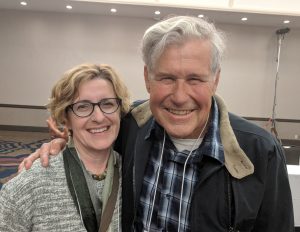 Dr. Georgia Ede, good friend and now fellow pure carnivore was the next speaker. Her talk was fascinating as always. Again she expressed frustration at the slow progress of scientists in testing dietary interventions, especially low carb diets for various psychiatric conditions. She has reviewed the few studies that do exist and summarized their strengths and weaknesses in this article. She pointed out that there is epidemiological evidence that depression, bipolar disorder, ADHD and schizophrenia are all associated with the Standard American Diet (SAD) and it has now been exported all over the world. She pointed out how sugary drinks cause a spike in adrenaline causing anxiety and insomnia and may well worsen any underlying psychological pathology like Anxiety, depression or ADHD. She pointed out that depression, schizophrenia, bipolar disorder and Alzheimer’s are all closely correlated with diabetes. And how many diabetic medications also help these conditions. She spoke about the studies showing diabetes improved with a vegetarian diet and pointed out how in all these studies, the vegetarian diet was just one of many interventions. Sugar and refined carbohydrates were also removed. The patients were often given exercise and relaxation therapies. Thus there is no way to sort out which of these interventions accounted for the improvements seen. She then suggested that meat products were a much better source of the essential vitamins, minerals and essential fatty acids the brain needs than plant sources and illustrated this with this chart:
Dr. Georgia Ede, good friend and now fellow pure carnivore was the next speaker. Her talk was fascinating as always. Again she expressed frustration at the slow progress of scientists in testing dietary interventions, especially low carb diets for various psychiatric conditions. She has reviewed the few studies that do exist and summarized their strengths and weaknesses in this article. She pointed out that there is epidemiological evidence that depression, bipolar disorder, ADHD and schizophrenia are all associated with the Standard American Diet (SAD) and it has now been exported all over the world. She pointed out how sugary drinks cause a spike in adrenaline causing anxiety and insomnia and may well worsen any underlying psychological pathology like Anxiety, depression or ADHD. She pointed out that depression, schizophrenia, bipolar disorder and Alzheimer’s are all closely correlated with diabetes. And how many diabetic medications also help these conditions. She spoke about the studies showing diabetes improved with a vegetarian diet and pointed out how in all these studies, the vegetarian diet was just one of many interventions. Sugar and refined carbohydrates were also removed. The patients were often given exercise and relaxation therapies. Thus there is no way to sort out which of these interventions accounted for the improvements seen. She then suggested that meat products were a much better source of the essential vitamins, minerals and essential fatty acids the brain needs than plant sources and illustrated this with this chart:
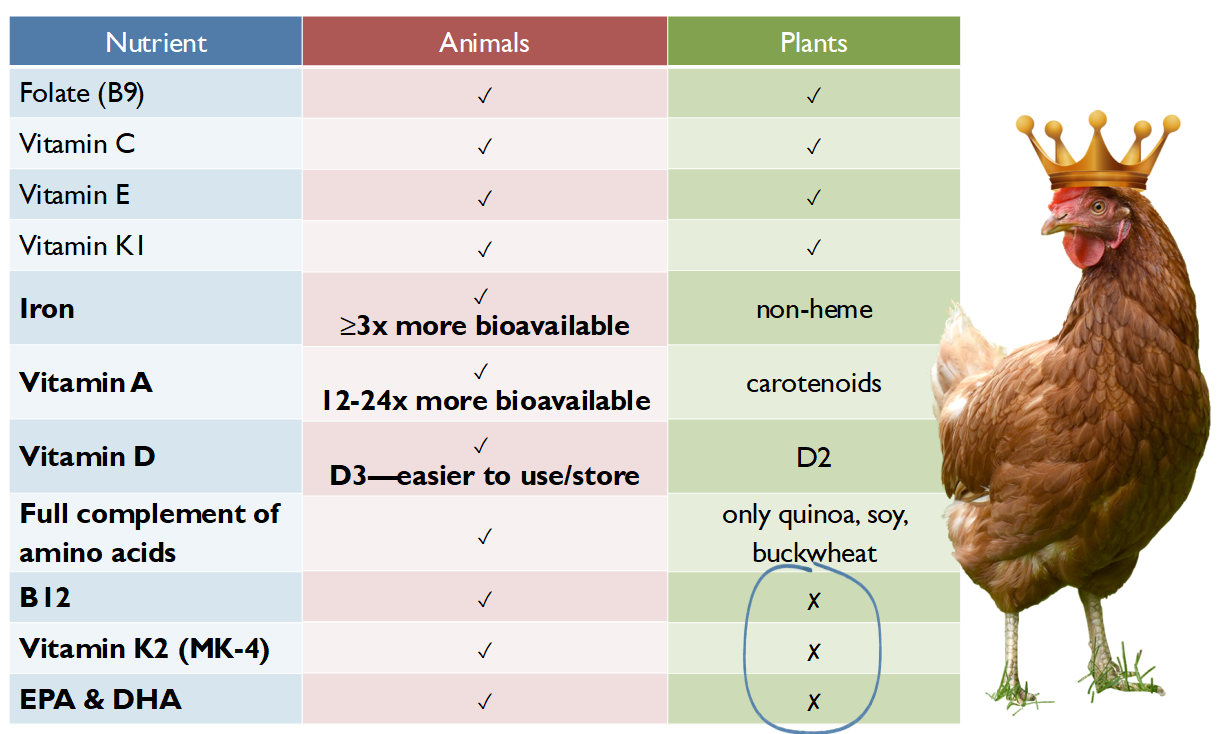
She further pointed out that many plant anti-nutrients actually interfered with the absorption of these essential substances, for example, protease inhibitors decreased protein absorption, oxalates and tannins both interfered with Iron absorption, goitrigens block Iodine uptake and phytates block the uptake of Iron, Zinc, Calcium and Magnesium. These anti nutrients could certainly be involved in psychiatric problems as Iron is required for Dopamine synthesis, infant brain development, neurotransmitter synthesis, hippocampal function, energy production, cell signaling and Zinc is required to Converts B6 to active form, serotonin synthesis, and dopamine transport. The brain is 70% fat ans 20% of the fat is either DHA or EPA omega-3 fatty acids. Neither of these are made by any plant. Only about 6-9% of the plant omega-3 we eat, primarily ALA can be converted to EPA which we can in turn convert to DHA so plants are a very poor source of the omega-3 fatty acids (fish oil) that are essential for health. Here’s the result:
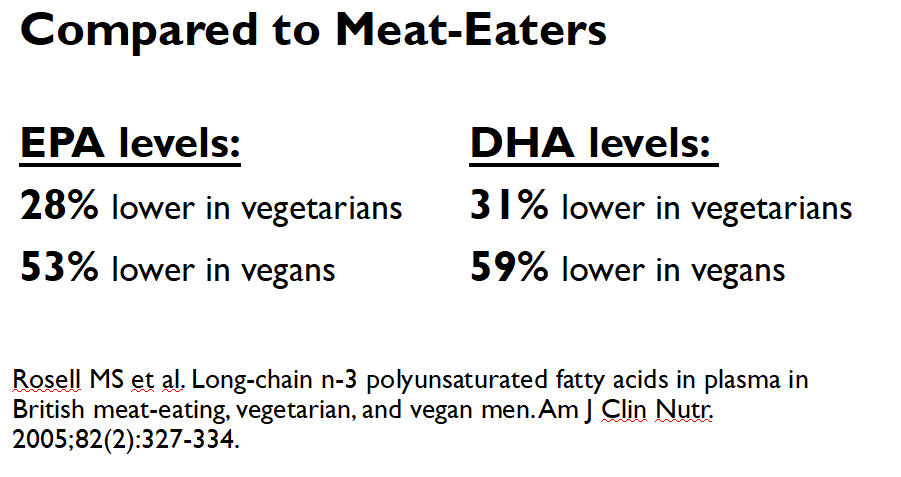
She recommended avoiding dairy stating that there were growth hormones in it that could affect humans systems, humans could not digest Casein well, and it was high in the sugar lactose. She pointed out that many antioxidants from colored fruits and vegetables but none had been proven to produce anti-oxidant activity in humans. These were often very poorly absorbed unless highly refined and concentrated and were often sold in vehicles very high in sugar which is addictive. Here are some examples of the deceptions:
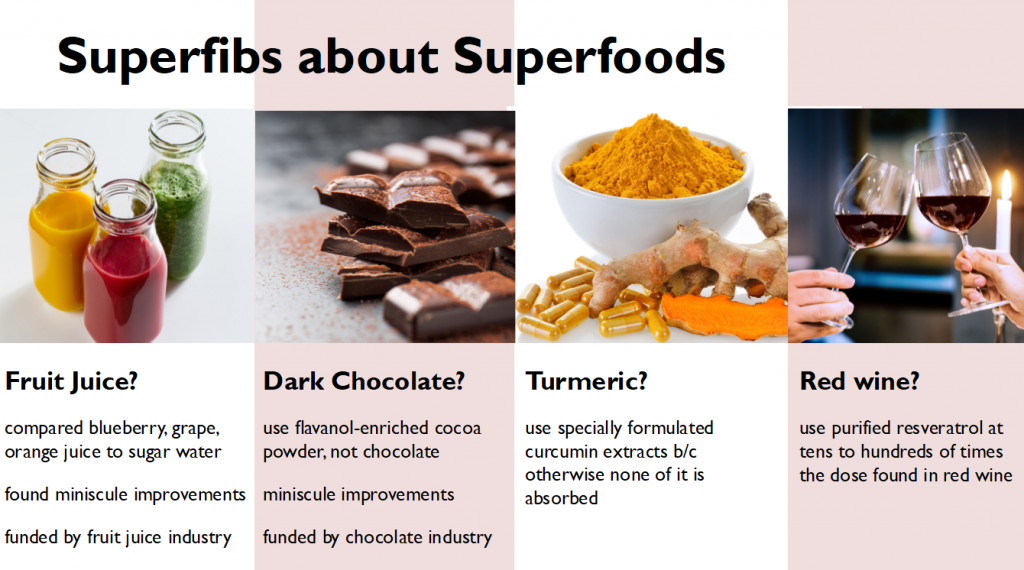
She suggested if you’re having a lot of trouble with foods in your diet considering eliminating all plant foods and just eat meat for a while as it provides everything essential for life and plants are the most likely cause of sensitivities. Then you can try adding foods back in and get an idea of whether you are going to tolerate them. She reported eating nothing but meat with no dairy, no eggs, and no beef for 10 weeks and losing 14 lbs. She plans to continue eating this way indefinitely if it continues to go well. She said sometimes there are no randomized controlled trials for the diet you think might be the best and in times like that you have to “be your own guinea pig”.

Our final speaker was Dr. Kristie Sullivan PhD. I loved her positive approach to living a keto lifestyle. Her presentation was full of energy, humor, passion and wise advice. She has this webpage on the Diet Doctor site with a biography and links to her books and recipes. If there is such a thing as the “haute cuisine” of keto her food looks like what I imagine it would be. Her presentation was so interesting and engaging that I forgot to take notes and at this late hour I am having trouble remembering the details just how much I enjoyed it. I do remember one story she told that I thought was brilliant and so believable. She and her girlfriends were together for an evening out and one of them said she really wanted doughnuts. So they decided to go to the doughnut shop. One of her friends turned to her and said “we’re all going to have doughnuts”! She worried about what she would do and finally came up with a plan. She held back to the end of the line and asked for a coffee with lots of heavy cream. Then she went to the table and raved about the coffee with all that cream and how wonderful it was. It worked and her friends were able to accept that she was celebrating with them. She is a very wise and talented teacher. I urge everyone to check out her books, recipes and talks.
The Day 4 summary won’t come out till Tuesday as I will be traveling back to Albuquerque right after the conference ends Sunday night. Good night.

Please address questions or comments to the following email:
ZeroCarbDoc@gmail.com
Please join my Facebook Group – Zero Carb Doc
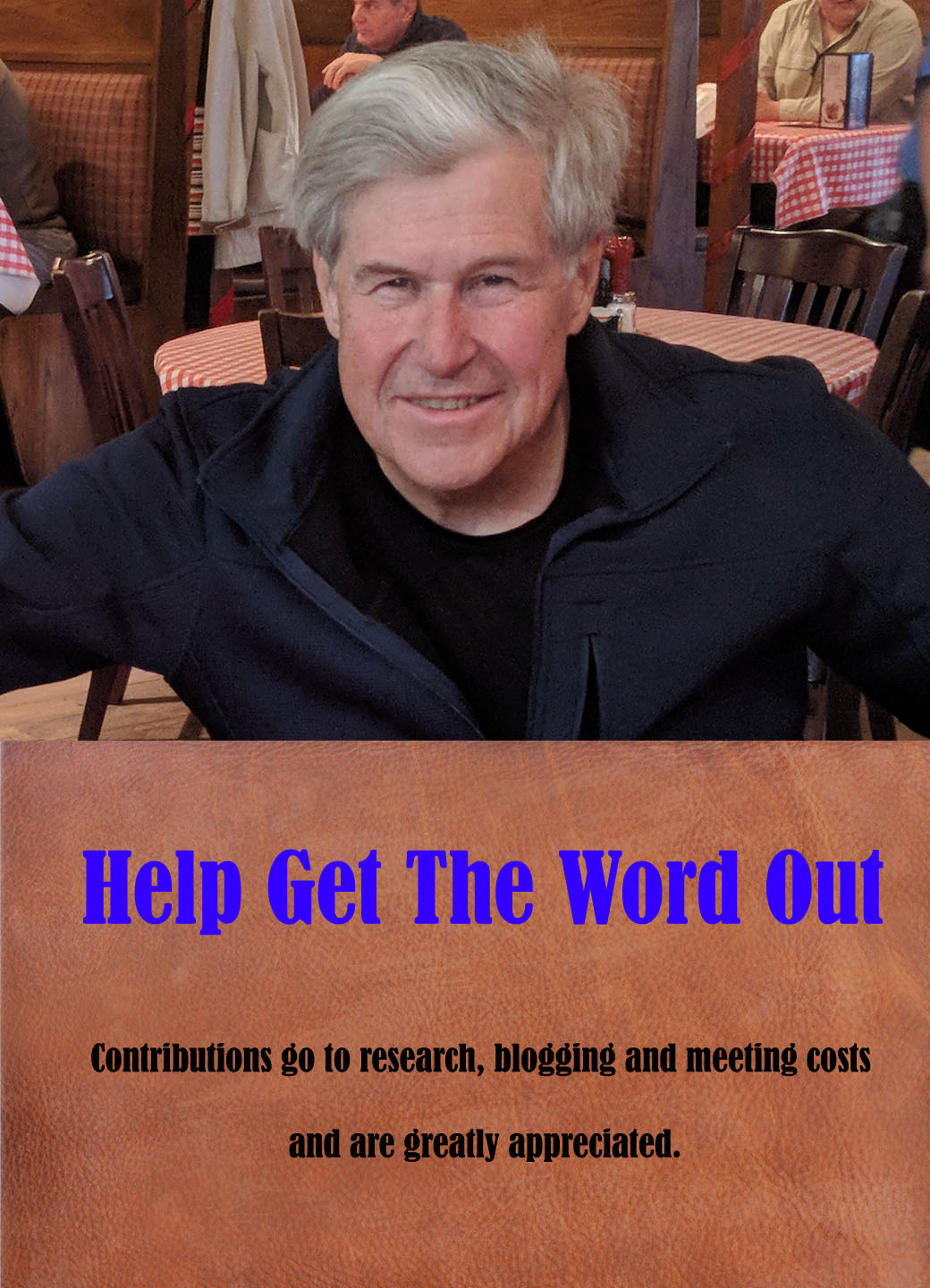
When jeff Volek says a keto-adapted person can burn 1.5 gram fat per hour, does this mean this person will burn 36 grams of fat a day?
That would be in 24 minutes. 24 hours at 1.5g/min would be 2160 g. I’m wondering if that would be the max rate while exercising.
Asha if someone is burning 1.5 grams of fat every minute for an hour (60 minutes), since each gram of fat releases 9 calories of energy the are burning 1.5 X 9 X 60 calories which is 810 calories like Dr. Phinney said.
Fortunately if you go U-Turn style you never have to count another calorie
Based on Volek’s research, that is very likely 1.5 grams fat/minute for keto adapted athletes during exercise. Or about 90 grams/hour, or around 810 calories/hour.
Which is a lot.
Reference here:
https://www.sciencedirect.com/science/article/pii/S0026049515003340